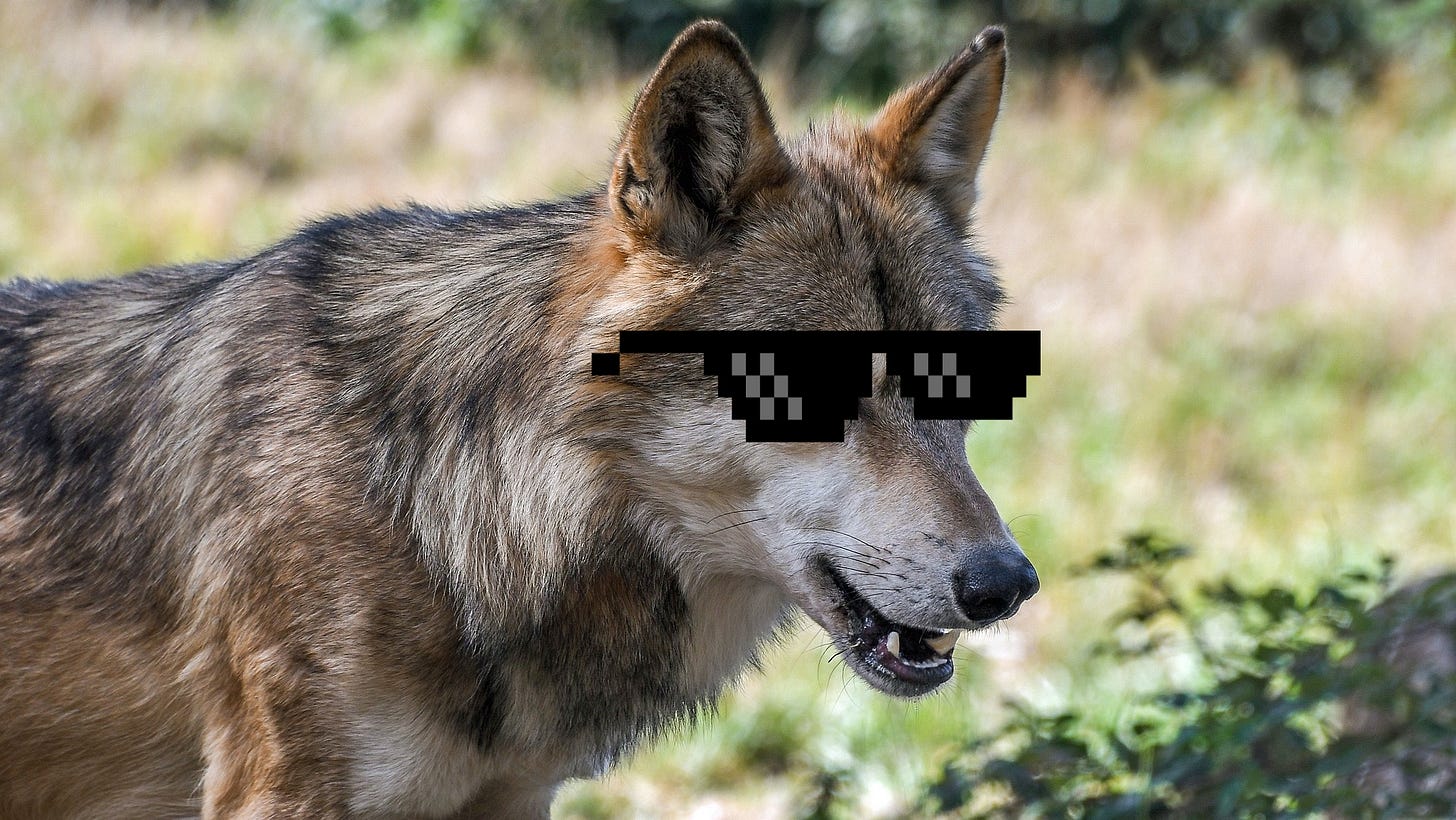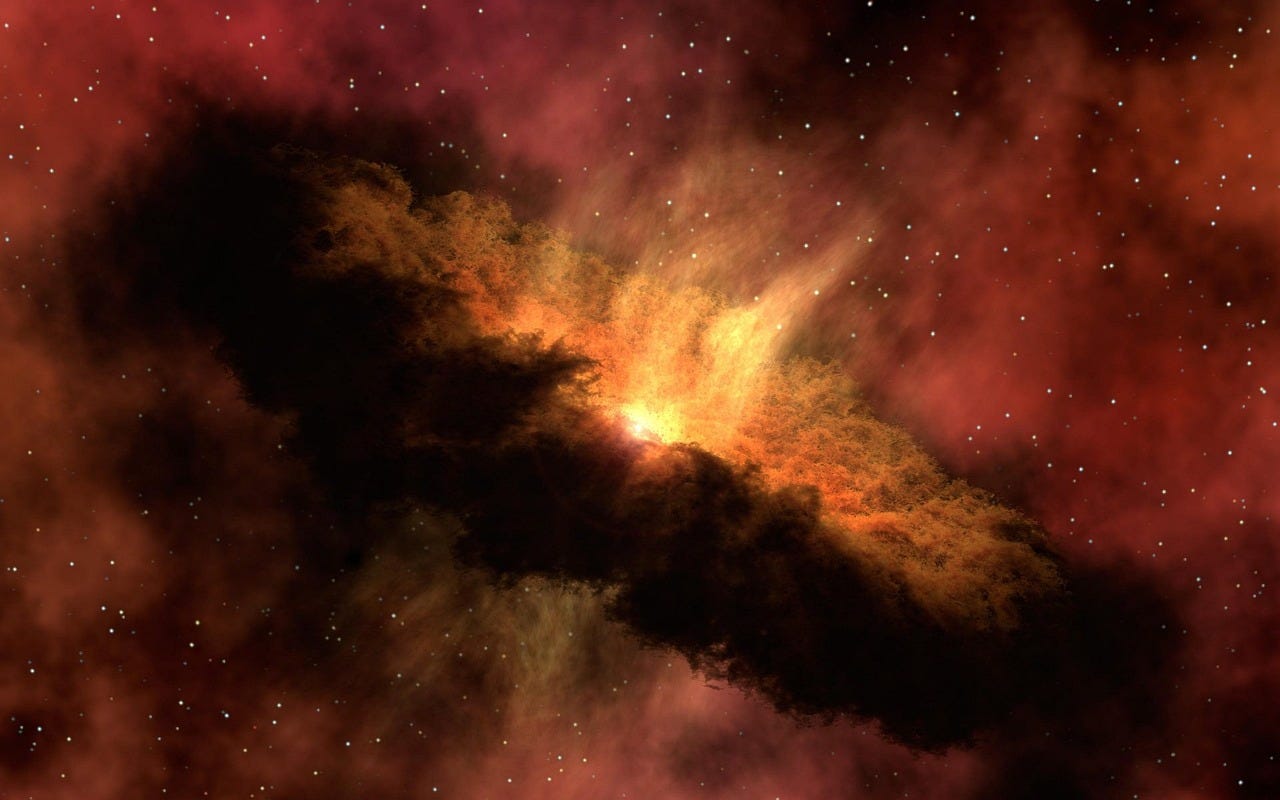Chaos, Order, and the Struggle for Survival
On Creation and the emergence of human instincts. Genesis, part 1
The universe is always changing, always moving. From tiny atoms to great galaxy superclusters, matter is always in flux. This process, unimpeded by any other force, is directionless. It is pure Chaos.
As two or more Chaotic movements come into contact, they begin to act upon one another. We see the emergence of something measurable, predictable. Some have called this Order.
If this Order is weak, it quickly disintegrates under the more powerful forces of Chaos that surround it. If this Order is strong, it can maintain itself, and resist the Chaos. A sufficiently powerful force of Order may even begin to act upon, and eventually assimilate, Chaos; in this way, a powerful force of Order not only maintains itself, but grows. As it grows, Order becomes more and more capable of pushing back on the surrounding Chaos.
But Chaos is everywhere. This Ordering process is happening in many places, all at once.
Eventually, powerful forces of Order meet and act upon one another. These forces sometimes converge, or the stronger force assimilates the weaker. At other times, the weaker force is simply annihilated, and Chaos takes its place once again.
Forces of nature do not have goals, but if they did, one goal would reign supreme: Survival1. The continuation of Order. An eternal struggle against extinction and the re-emergence of Chaos.
The Organism
Imagine this process taking place over billions of years. What might happen?
We already know, of course. Each of us is the product of billions of years of this Ordering. At some point in the Earth’s history, something new emerged—the Organism—which has become a force of nature unto itself. It is not merely a force of Order, but an Order made up of countless Ordered and Chaotic forces. All organisms2, all living creatures, are parts of the greater Organism. No matter how many organisms die, the Organism survives, re-Ordering itself as needed to resist the surrounding Chaos.
To our knowledge, primitive organisms acted purely on biological programming (instinct), and lacked the capacity for self-reflection. In the absence of prior rules or guidance, then, all actions must have initially been equally valid, and thus directionless. In other words, these primitive organisms did not choose to act in any particular way, but simply acted. So how did they survive?
Well, we know that some organisms survived, while others did not. Those that did passed on genetic traits and behaviours that promoted the continuation of their species (Survival), which presumably included the Survival instinct itself. In this way, Survival perpetuated itself into becoming the primary goal of all living creatures. Over time, living creatures—again, without conscious direction, through many millennia of trial and error—developed relatively dependable methods of Survival, including various means of self-defence, sustenance and reproduction. Things that promoted Survival came to be instinctively recognised as good (marked by pleasant feelings such as pleasure or satiation), and things that undermined Survival were recognised as bad (marked by unpleasant sensations such as pain or hunger).
In this way, Survival—at the levels of both the organism and the Organism—became a simple matter of trusting one’s instincts.
Survival
Is survival really that simple?
Consider a predator—a wolf—on the hunt for prey. The wolf, weighing up whether to hunt a large elk, might ask itself: am I more likely to die to this elk, or die of starvation? There is a clash of instincts, a recognition that the wrong choice could mean death. For organisms that lack the capacity for self-reflection, the answer must come down to an instinctual risk-reward calculation. Am I so hungry that I would risk my life to eat? The decision to hunt is only made once the feeling of hunger overpowers the feeling of fear. This decision is complicated by factors such as a creature’s own risk aversion, the ‘thrill of the hunt’, or the danger a potential target presents, but in the final analysis the dilemma is a fairly simple one.
What happens when we add reproduction to the calculation? An important point to recognise is that, unfortunately, this has not always been a voluntary act. In response to the instinct to reproduce—and lacking prior social rules—the physically stronger of a species (typically the male) would often have acted upon his instincts with force. The female had to develop ways to maximise her own (and her offspring’s) survival. Becoming stronger/more threatening was an option, but relying on a stronger male or a group for safety would also have been effective. The attraction of females to markers of strength in many species suggests that this strategy does seem to have developed (although the exact incentives are more complicated3 than I’ve laid out here). In response, the males would then have adapted either to compete with other males or to more effectively woo their female counterparts. The timeline is pretty messy, but what we’re seeing is the emergence of (still primitive) social behaviours that improve the chances of Survival for both males and females of a species.
Returning to our wolf: if a male wolf can demonstrate his value to a potential mate, perhaps by showing his ability to protect her and her potential offspring, or by providing regular access to choice cuts of meat, might she be more likely to choose him as a mate? Well, it certainly seems to be the case for humans4—and in this we see the emergence of a new instinct, the drive for status. Over millions of years, certain traits and behaviours would have proven more beneficial in the competition for resources or access to mates. Incidentally, these traits would also have proven beneficial to the pack as a whole. A stronger, faster, or cleverer wolf is going to make the acquisition of resources much easier for his friends and family. In this way, he would become the wolf ‘every man wants to be, and every woman wants to be with’.

So how does the third Survival instinct, reproduction, fit into the wolf’s hunt calculation? He needs to account for how a successful hunt might impact his chances of mating back home. Perhaps he is already a high-status wolf, and so must maintain his status by ensuring that his mate (and the pack) are well fed. Maybe he is a low-status wolf, and recognises that such a kill might be the key to higher status in the eyes of potential mates and/or other members of the pack. In any case, there is now far more reason to hunt the dangerous elk than to go berry picking. Weighing this up against the potential risk, the choice becomes clear: the hunt is on!
Conclusion
Survival: self-defence, sustenance, reproduction. In group-based species, we now also add status (the four Ss!). All of this to maintain Order, the continuation of the greater Organism, and to resist the ever-encroaching Chaos.
To be clear, all of this is still occurring at the level of instinct. Wolves do not philosophise; they do not think through the consequences of each and every action they could take. They learn through experience what works and what does not, and what works eventually becomes accepted practice within the pack. But what of humans? We have instincts, but we are also capable of abstract thought. We are very conscious of our mortality, and have developed sophisticated technologies and social institutions to ensure the survival and continuation of our species. How did we get here? In the series that follows, I’ll extend this narrative into the realm of humanity. We’ll touch on intelligence, consciousness, and human sociality; we’ll discuss the importance of stories, and creep toward an understanding of the role of religions and political institutions in all of this. Stay tuned—and perhaps consider subscribing—for part 2.
I define capital-S Survival in a particular way in this essay - as the continuation of Order. By this definition, a creature that successfully reproduces before being killed by a predator is said to have achieved the goal of Survival for its lineage/species, even though it has not itself ‘survived’ in the traditional sense of the word.
Here Wikipedia’s definition will suffice: an “organic, living system that functions as an individual entity”. This is distinct from capital-O Organism as a force of nature in the universe.
I’m aware that this interpretation is not quite the way evolutionary theorists would lay out the argument. Evolutionarily speaking, our instincts would likely prioritise reproduction over individual survival. The male is primarily motivated not by protection of the female mate, but by ensuring that other males do not have sexual access to her, and that his own offspring survive; the female is primarily motivated to maximise her chances of reproduction, and to ensure that her offspring are protected and materially provided for (even to her own detriment). However, evolutionary incentives are not straightforward, and I believe there are good reasons to highlight these other aspects of Survival alongside reproduction. I will return to this in a future post.
I actually wasn’t able to find any studies on this for wolves. Am I looking in the wrong places? Feel free to send through any articles you can find on this topic.




